SITE GUIDE
SEARCH
REVIEWS
FEATURES
NEWS
Etcetera and
Short Term Listings
LISTINGS
Broadway
Off-Broadway
NYC Restaurants
BOOKS and CDs
OTHER PLACES
Berkshires
London
California
New Jersey
DC
Philadelphia
Elsewhere
QUOTES
TKTS
PLAYWRIGHTS' ALBUMS
LETTERS TO EDITOR
FILM
LINKS
MISCELLANEOUS
Free Updates
Masthead
Writing for Us
A CurtainUp Review
Brits Off Broadway --2007
By Elyse Sommer
Reviewers: Brad Bradley, Alexis Greene, Elyse Sommer, Betsy Winchester,Liza Zapol
About the Festival: The Brits Off Broadway dramafest at the busy 59E59 Theaters was successful enough to become an annual event.Ticket and complete performance schedule details: 212/ 279-4200 or www.59e59.org
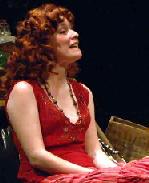
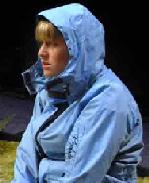
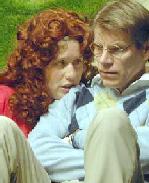
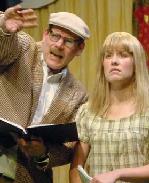

Claudia Elmhirst & Bill Champion in some of their many roles in, Intimate Exchanges.
See Review.
|
|
An * will be added when a review is posted.
*The Receipt
*Memory
*Silverland
*Rosebud
*Rabbit
*Radio
*Intimate Exchanges-A Sequence of Plays

Will Adamsdale and Chris Branch in The Receipt
|
Somewhere behind that face is a wild animal smashing about a cage.—
Wiley on the polite expressions of pedestrians.
It's a well-known paradox that the more crowded a city is, the harder it can be to make a real connection. In The Receipt Will Adamsdale, whose Jackson's Way premiered at the 2005 Brits Off Broadway, returns to collaborate with sonic artist and performer Chris Branch. As Wylie he's a common man surrounded by the quiet atrocities of a work-a-day life who becomes obsessed with reaching out. The constant contact and ceaseless jabber that city life affords threaten his sense of self and drive him to the breaking point.
With Adamsdale and Branch's clever approach to storytelling, Wylie's tale takes place long ago and far away in a city that sounds a lot like 'Glondon.' From this "distant" perspective, Wylie looks more like the sane one in a mad world filled with belittling corporate messages and endless minutae that just happens to be ours.
Though there is a grander message, it is delivered with mirth and wit and is anything but heavy-handed. Branch's inventive soundscape created from a Mac, a keyboard, and, in his hands, a very expressive filing cabinet, manifests the mechanized world of the city. As Wylie's smarmy boss and an array of "service professionals" Branch is a superb comic foil to Adamsdale.
The whole chain of events is set in motion when, on his way to work, Wylie picks up a discarded receipt and decides on a whim to pocket it. After a rediculous day, he heads home, his mind returning to the receipt and how difficult it would be to find it's owner. Difficult but not impossible. The next morning, he starts work early, finishing his errand from the day before. When he returns to the office, he's exhausted, hounded by the ludicrous demands of the doorman, and hangs up on a very important customer. He panics when he can't tell the man what his company does. When his boss calls him into his office, the question "What is it that we're doing here?" hangs in the air and Wylie is subsequently fired. It's at that moment that finding the owner of the receipt becomes his manic quest. Through a few chancy moves, he eventually finds the server who made the sale to the unknown customer. The owner still escapes him, but he has come so close in only one day. He's elated, until he arrives home to find his locks to the company flat changed, and so, with nowhere else to go, he finds his way to the storage unit where they've piled all of his belongings and sneaks into it to spend the night. He doesn't know what the next day will hold, but he has hope and a twisted kind of freedom.
Though not without a few dips and lags, The Receipt is decidedly weird and wonderful. Adamsdale and Chase elicit some big questions while shining a spotlight on how marginalized we can allow our lives to become. One nagging question remains: With real connection being so difficult, why do people flock like moths to bright, shining cities--where the weight of corporations bears down on the little man and invites him to abandon personal considerations for their own simpler purposes? Aside from the desire for money and fame, why do people do it?
Perhaps because as much as it can be maddening, there is also something very peaceful about being lost in a sea of people. It's just that sometimes you're on top of the wave, and sometimes the wave is on top of you. Adamsdale and Chase have skillfully caught a nice swell and are riding high.
THE RECEIPT
Devised & Performed by Will Adamsdale & Chris Branch
Dramaturg: Kate McGrath
Design Help: Mervyn Millar
Closing Song: Corey Dargel
Running Time: One and a half hours, no intermission
From 5/03/07 through 5/27/07; opening 5/06/07
Tickets: $25
Reviewed by Betsy Winchester based on May 6th matinee

Vivien Parry & Simon Nehan in Memory
|
The recovery of memory is a present-day activity. It's not the past. Memory occurs in the present, memory must live in the present and it must be truthful— from a discussion of the play within the play's rehearsal.
Like The Pull of Negative Gravity seen at the 2005 Brits Off Broadway Festival , Jonathan Lichtenstein's Memory is powerful and often painful to watch. In just 90 minutes this complex drama moves from Berlin to Bethlehem, from the early 1930s to 2006. It entails two stories —actually three, for this is a play within a play and the scenes showing the actors rehearsing these dual tragedies are more than a theatrical device. Besides leading us gradually into the emotionally devastating central story, the actors playing themselves provide the ordinary theater goer with an enlightening glimpse into the toll such plays take on the performers. This is especially evident in watching Vivien Parry who plays Eva, a Jewish woman whose experience during the Hitler regime have kept her so mentally crippled that she has remained alienated from the relatives who might have helped to ease her pain. While the entire cast is outstanding, including Christian McKay as the director who leads the actors into the grim terrain of the play with a Bach fugue, Parry has the formidable task of switching from vibrant young woman, to anguished wife and mother, to bitter old age.
Lichtenstein's theme is encapsulated in the title. It illustrates how we tend to force painful memories into the deepest recesses of our minds and how burying or trying to revise those memories makes for festering sores. The main plot revolves around Eva (Parry), her marriage to a fellow Jew Aron (Simon Nehan) and their relationship with Aron's Ayrian partner Felix (Daniel Hawksford) who happens to be besotted with Eva. That triangular situation resurfaces years later. Felix is now a Nazi officer. Eva and Aaron are in desperate straits. They've been unable to find a haven outside Germany for themselves and the two little boys they took in years ago but were unable to send to safety on the Kindertransport with their own son.
It's in 1990, shortly after the fall of the Berlin Wall, that Eva's American grandson Peter (Lee Haven-Jones) visits her and finds himself unwelcome, especially since he is determined to know why she has refused any connection to his family, a fact he senses is connected to the boys he has been told she saved. This visit is based on the playwright's own experience (his father was sent out of Nazi Germany on the Kindertransport and took him on a similar visit when he was thirteen). Not surprisingly the revelations about Eva's past are the most emotionally authentic and gripping.
Lichtenstein also has relatives in Israel so it's understandable that the ongoing conflicts in that country have also been of vital concern to him. However, I found his using the Berlin Wall to link Eva's story to the story of the dividing wall built by the Israelis in 2006 too much of a stretch. Both Oliver Ryan and Ifan Huw Dafydd give fine performances as Isaac, an Israeli soldier and Bashar, a Palestinian he tires to persuade to vacate his home peacefully to make room for the wall. However, while play within a play structure works very well, this segment is polemical and the dialogue seems deliberately written to liken the Israeli soldiers to Nazis rounding up Jews for the gas chambers.
The questionable preachiness and less engaging aspects of the Bethlehem plot notwithstanding, this forcefully written and performed play is sure to be one of the best and most talked about entries in the Brits Festival.
To read CurtainUp's review of Lichtenstein's Pull of Negative Gravity go here.
Memory
Written by Jonathan Lichtenstein
Directed by Terry Hands
Cast: Christian McKay (Chris/Director), Vivien Parry (Viv/Eva), Lee Haven-Jones (Lee/Peter), Oliver Ryan (Olly/Isaac), Ifan Huw Dafydd (Huw/Bashar), Daniel Hawksford (Dan/Felix) and Simon Nehan (Simon/Aron). Designed by Martyn Bainbridge
Lighting: Terry Hands
Sound: Matthew Williams
Presented by Clwyd Theatr Cymru (Wales). Running time: 1 hour 30 minutes.
May 5 — Sunday, May 27
Reviewed by Elyse Sommer at May 8th press preview
Silverland
Rave is indisputably maybe the greatest creation this haggard old nation come up wiv since the fucking electric toilet or whatever. But for once this shit wasn't made by the Rahdy Rah's, you get me? It was us that made the rave. Us. Here. Now. And for all time. . .I mean, who else on earf is having a better time than us right now? —Dario
As awareness increases about global warming, energy shortages, sea-levels rising and general disaster it is no surprise that there is an increase in movies and plays with apocalyptic themes. Silverland playwright Benjamin Davis sets his play on New Year's Eve 2011, when the Mayans' prophesized that the world would end. Set at a rave outside London populated by six manic types, the play explores these characters' visions of the end of everything.
Dario and Mikey are two foolish ravers, looking for a fix to celebrate the present. They buy a powerful drug from Stockers (a lecherous stockbroker, in a sometimes hilarious performance by Tim Steed). This drug also makes the rounds to Gabriel (another stockbroker) and Ellen (an artist played by Sophie Hunter), who instantly fall for each other. Cleo (a dancer at the rave played by Ony Uhiara) does not take the drug, though she seems to have mysterious powers.
We are then propelled into a series of circuitous scenes that review the moments following the drug-taking, out of sequence. While this may be an homage to the Momento/ Pulp Fiction/ Babel style of non-sequential storytelling, the effect is frustrating. The action is predictable and not interesting enough to hold our attention, and the style is confusing.
The physicality of the actors is commendable, and the kind of ensemble work that they attempt is rarely seen in New York. Their movement patterns help define the setting, which is helpful in the wide and yet cramped space of Theater B. Sometimes the movement is excessive for this small space,and the often forced voices, large gestures, and rushing of individual actors may because they are more used to performing in the larger Arcola Theater in London.
The raver clothing, drugs, and all the talk about money have the effect of putting us in the mid-1990's. The resurgence of rave culture alone gives a bleak, superficial vision of the near future. A real exploration of our bleak future is limited to the apocalyptic dreams of Ellen later dismissed as neuroses. The sexy Black dancer Cleo is revealed as a wise Cleopatra, giving a reassuring prophesy. Benjamin Davis perpetuates a familiar, yet harmful trope, casting the "other" as wise and yet objectified by the less enlightened characters. There are a few scenes which stand out as truly funny, where relationships are clearly defined and the dialogue is witty. Ellen wakes Gabriel up, yet again, to recount her nightmare about England being submerged in water. Gabriel has had enough of her neurosis, and is trying to sleep. The result is very comical. Dario and Mikey, wandering around in the desert have some very funny dialogue, though their cluelessness is almost unbelievable. While it is at times very witty, Silverland is half melodrama, half comedy, and as an audience we are caught in between. In an unfamiliar land with six hapless characters, we too are lost.
Silverland
Written by Benjamin Davis
Directed by Benjamin Davis
Cast: Cary Crankson, Sophie Hunter, Tom McClane, Tim Steed, Bradley Taylor and Ony Uhlara
Sets: Mark Friend
Lighting: Mark Doubleday
Movement Director: Jane Gibson
Running time: 110 minutes
From 5/15/07 to 6/03/07
Tuesday- Friday at 8:15 pm, Saturday Sunday at 3:30 pm.
Reviewed by Liza Zapol based on 5/16/07, 8:15pm performance
Rosebud: The Lives of Orson Welles

Christian McKay as Orson Welles
|
Those who have followed Welles' career in theater, film, and even television in its final phase, will find much of the material familiar, while those who only vaguely know of him as a Hollywood fossil will not; both groups, however, will both find much to wonder about in this portrayal. The actor at hand, Mr. McKay, has toured the work considerably and deservedly won awards, notably at the Edinburgh Fringe festival. I was fortunate to see the production at a brief producer's showcase three years ago at Pace University, and my second viewing this week was more than welcome.
Naturally we hear of Welles' brief trajectory as a theatrical wunderkind, rising to considerable attention with the Federal Theater's Harlem version of Shakespeare's Macbeth. (According to Welles, Shakespeare "is a manual for living" and this staging was his first chance to illustrate that theory in high profile. The New York branch of the Federal Theater led by Welles and John Housman ran into political obstacles with the Marc Blitzstein labor protest musical called The Cradle Will Rock. This work, as least as interesting for its own unique production circumstances as for its boldly socialistic message, was called "dangerous" by the U.S. government. After the collapse of government support, Welles created the Mercury Theater, presenting on stage a memorable Julius Caesar, and on radio, a version of the H.G. Wells futuristic science fiction tale War of the Worlds, which created a considerable stir in large numbers of its vast CBS audience. The 32 million who tuned in on that Halloween night would be comparable to about 75 million today, or about one in four people in the entire country.
Welles's grand detour from New York to Hollywood of course centers on his initial and most memorable film creation, Citizen Kane, a cinema classic that is a thinly-disguised sharp poke at the media mogul William Randolph Hearst. Although Welles was given an extraordinary four-film contract with rights to act, direct, write, and even produce, his political enemies again got in the way, generally crippling his film career, and particularly causing the mangling of The Magnificent Ambersons, a film about "the illusion of progress" that many believe would have been a masterpiece, had not much of the footage he selected been destroyed while Welles was conveniently away in Brazil.
At the end of Rosebud: The Lives of Orson Welles, we see Welles struggling for survival, engaging in various film projects that remained unfinished, and making money for them in whatever means he could, particularly in commercial television, where he became a barker for everything from soft drinks to wine and from frozen peas to fish sticks.
The fluid production enhances McKay's multi-faceted portrayal, especially arresting in his transformation from a rugged leading man into a 20th century Falstaff, incidentally a role on which many would say Welles put a definitive stamp in his film Chimes at Midnight. While no design credits are given, director Josh Richards' production does deserve credit for effective lighting, projections, and sound, as well as varied use of a very limited space. Welles' supreme awareness that he was forever either on stage or on camera makes the Brecht-inspired directorial device of occasionally drawing the audience's attention to the light and sound effects an apt addition.
ROSEBUD: The Lives of Orson Welles starring Christian McKay as Orson Welles Written by Mark Jenkins
Directed by Josh Richards
No Design Credits Given
Running time: approximately 90 minutes (no intermission). Presented by Atomic80 Productions
Tuesday, May 29 — Saturday, June 10.
Tuesdays to Saturdays at 8:30, Saturdays at 2:30 and 8:30, and Sundays at 3:30 and 7:30 p.m.
Reviewed by Brad Bradley May 30th.
Rabbit
I'm twenty-nine. I'm never going to be twenty-eight again. I'm never going to be eight again. And I miss it. I've left so much behind. And it all gets lost —Bella

Charlotte Randil in Rabbit (Photo: Robert Workman) |
Birthday parties have been used to jump start many novels and plays. The birthday party in Nina Raine's Rabbit, is an intimate gathering of young professional women and two men both of whom are the birthday girl's ex-lovers. All are good looking and extremely verbal.
Bella (Charlotte Randle) and her friends, Emily (Ruth Everett) and Sandy (Susannah Wise) are the sort of women who are not shy about their sexual appetites and conquests, traits once attributed to men. It was Bella, and not the male party guests who ended the affairs and Richard (Adam James), who Bella almost married but left for Tom (Alan Westaway—-the second man at the party) still smarts from the unsatisfactory ending to the love affair.
There's also a competitive situation between Richard and the outspoken Sandy since both are writers, he as a sideline to his career as a barrister, Sandy full-time—but neither successful enough to warrant this sort of rivalry. Though best friend Emily, a doctor, seems to have no axe to grind with anyone, Richard and Tom, and for that matter, most young men likely to be part of this circle of friends and lovers, would be appalled to listen to Emily and Bella's quite clinical discussion about the shape of Tom's penis. That initial and quite amusing girl talk makes it clear that this birthday celebration is likely to errupt into a volatile verbal joust likely to reveal much that's not right with Bella & Company's world.
But Raine, a much touted first-time playwright, has more on her mind than a contemporary cocktail lounge version of a Shaw drawing room discussion play, or a dramatized version of one of those chick-lit novels beloved by women in their late 20s and early 30s. The very first scene is between a trenchcoat clad, tense Bella and her father (Hilton McRae) in a hospital room. We learn that they've had a close but often troubled relationship and that he appears to be dying of a brain cancer and that the title stems from his pet name for Bella when she was a child.
The father's cancer and Bella's having to come to terms with the problems in that relationship (his philandering and demands for her to succeed, her dependency on his love and guidance despite the independent, career woman veneer) is a metaphor of sorts for the go-nowhere relationships, compromises and insecurities lurking beneath the surface of Bella's fun, sex and success filled world. Thus it is not unexpected that other flashback scenes with the dying father are interspersed with the escalating tensions of the birthday celebration which are exacerbated by the fact that Bella can't bring herself to tell her friends about her family tragedy. In short, what we have are two plays tied together by a celebratory and a tragic event.
Ms. Raine, who is also directing, has managed to physically stage the flashbacks effectively. However, the thematic integration of the father-daughter conflict with the sexually charged party scene is less successful, which is also true for her making Bella's friends more fully rounded, knowable characters.
While the father-daughter situation is more moving than the slick party talk, the party with its sharp observations, putdowns and confrontations is more amusing and entertaining — especially so since the terrific cast from the play's Evening Standard and Critics' Circle Award winning London premiere. is on hand to reprise those roles.
The lack of backstory for Bella's friends notwithstanding, the actors playing them engage you sufficiently to overlook this still emerging playwright's weaknesses and make new playwright watchers want to keep an eye out for future works by Ms. Raine. She's already completed a commissioned second play, Tiger Country, so don't be surprised if it shows up at next year's Brits Off Broadway Festival.
RABBIT
Written and directed by Nina Raine
Cast: Charlotte Randle (Bella), Hilton McRae (Father), Ruth Everett (Emily), Alan Westaway (Tom), Adam James (Richard), Susanna Wise (Sandy)
Designer: Jamie Todd
Lighting Designer: Colin Grenfell
Sound Designer: Fergus O'Hare
Running Time: Approx 1 hour and 40 minutes, including intermission
June 5 — Sunday, July 1; opening July 10th
Reviewed by Elyse Sommer Sat June 9th
Radio
On July 21st, we all went outside. We switched on our radios, stood in the colourless bomb craters and looked up. It was night time for us, everything was black and white. My old man had written me, told me the date they'd be landing. He said he had supplied the flag that they'd be leaving there, and that he'd sewn my name into it.
—Charlie Fairbanks, Jr.
—Charlie Fairbanks, Jr.
Brits Off Broadway is a boon for those of us who do not make an annual pilgrimage across the pond and want to keep abreast of what is happening in England, particularly beyond the West End. So it is somewhat ironic that this importhas more to do with the US than the UK. Written initially for BBC radio, Radio is apparently the first in a trilogy of plays that Al Smith is writing about the US space program, with which his father was involved during the 1960s. Running slightly under an hour, the play takes place in the memory and imagination of one Charles Lebanon Fairbanks, Jr. (Tom Ferguson), who, we learn toward the end, has gone to fight in the Vietnam War and possibly has died. Born in Lebanon, Kansas, to a farmer turned flag maker, he developed a fascination with outer space, and no matter where the father's work took the family—from Kansas to North Dakota to California—young Charlie focused on the moon and the stars, and on space travel. Indeed part of the play's aim is to recreate that brief period in the 1950s and ‘60s when the space race between the US and the USSR occupied the thoughts of many Americans, who saw victory over Communism in being the first superpower to put a man on the moon.
As a piece of dramatic writing, Radio is both relatively straightforward and also enticingly suggestive. Charlie tells the story of his life, from birth to death, in chronological fashion, with detours every now and then for a descriptive or humorous anecdote about his mother or father—particularly his father, whom he idolized as a youngster. But every now and then Charlie riffs about space flight, the moon and being above the earth, and at these times playwright Wilson gives metaphoric dimension to this affecting tale of a young man growing up. The earth, as those first photographs from the moon revealed so long ago, is an isolated blue orb floating in black space, and a young man coming of age in a confused world can be just as isolated, just as unanchored.
I suspect the play would be even more affecting if the actor playing Charlie were more relaxed and concentrated. Moving around the intimate black box theater at 59E59, occasionally sitting on the lone piece of furniture—a bentwood chair—Ferguson appears strained, as though forcing some of the emotion that the script requires of him. Director James Yeatman, does not seem to have helped Ferguson simply take the time to make transitions between moments and memories. Still, enough of the pathos and humor of Radio comes through to make this small, quiet piece of theater a pleasant finale to the festival. Radio
By Al Smith
Directed by James Yeatman
Cast: Tom Ferguson (Fairbanks) Lighting Designer: Neil E. Hobbs
Running time: 54 minutes
Tuesday-Friday at 8:30; Saturday 2:30 and 8:30; Sunday 3:30 and 7:30 Tuesday, June 12 — Sunday, July 1
Reviewed by Alexis Greene onJune 13, 2007
Intimate Exchanges-A Sequence of Plays
Have you ever reflected how those tiny decisions we make every day of our lives can often require us to make further small decisions that lead to larger decisions which then demand a really big decision, forcing you into those vast decisions that finally lead to the truly monumental decisions? At the very start of Intimate Exchanges, a woman is faced with a small, fairly trivial decision. Should she resist having that first cigarette of the day before 6 pm. On some nights her willpower is strong enough, on others it isn't. The two quite separate chain of events that result from her choice lead, by the end of scene one, to another character making two further decisions, this time of a slightly more important nature. Just before the interval two more choices, more crucial still, are made. Finally, proceeding to the fourth and final scene, another major course of action remains to be chosen by the characters.
— Alan Ayckbourn, in his 1984 introduction to his concept for Intimate Exchanges. He concludes by explaining that what the audience will see on any given night "is a single strand of a much larger web of interconnecting alternative scenes."
— Alan Ayckbourn, in his 1984 introduction to his concept for Intimate Exchanges. He concludes by explaining that what the audience will see on any given night "is a single strand of a much larger web of interconnecting alternative scenes."
So is Alan Ayckbourn's jigsaw puzzle in eight parts another must-see marathon like Tom Stoppard's Coast of Utopia which dominated the New York theatrical season?
To be sure, these eight separate but inter-connected plays — all triggered by the same minor decision (to open a pack of cigrarette and light up or not)— are fiendishly clever examples of Ayckbourn's predilection for theatrical jigsaw puzzles and people (especially women) trapped in unhappy marriages. So clever in fact, that what may sound like a gimmick devised for maximum laughs, substantiates the author's more serious intent: to illustrate the randomness of life — how a casual act like lighting a cigarette or turning down one street instead of another, can affect the course of our lives.
To add to the sense that the first American all-in-one presentation of these plays (written over twenty years ago) is an attention must be paid event, there's the cast. You're not likely to see two more astounding performers than Bill Champion and Claudia Elmhirst who have taken on the herculean task of playing the two key characters — curmugeonly, poison-tongued boarding school headmaster Toby Teasedale and his rather uptight, much put-upon wife Celia — as well as everyone else. That means as many as six characters in one play, with enough quick costume changes to boggle the mind and a text that according to Bill Champion has more lines to commit to memory than Hamlet, Macbeth and King Lear combined. I might add, he and Ms. Elmhirst do so without a single stumble and that their acting never hints at pulling off a stunt but gives us a cast of characters with whom we feel great empathy, so much so, that you tend to forget that you're watching just two actors.
While the The Coast of Utopia also has a repeat opening scene (Brian F. O'Byrne's dramatic entry in a storm tossed chair) it is not a comedy but a historic epic. In the same vein, Intimate Exchanges isn't all about one liners and farcical pratfalls but a tragi-comedy about people whose disappointment with life and their relationships add a sad and poignant undercurrent. Nevertheless, the plays do fall within the rubric of comedy by virtue of the multi-tasking cast set-up and much of the dialogue, and there is considerably more repetition — for example, all but a minute of the first hour of Affairs In a Tent and Events on a Terrace identical. When seen without an interval of more than a few hours or days, this can have an adverse effect on the audience response the second time around. comedy.
Thus, brilliantly executed as all these plays are, I feel (actually so does Mr. Ayckbourn) that seeing just four of the eight plays—— five at the most (the number I saw)—— is probably enough of a wonderful thing. It would also be advisable to schedule your choices per the recommended groupings (see the end of the overall production notes) for a minimum of twice played scenes and getting the best bang for your buck.
I speak from experience since I scheduled my first two Exchanges based on the convenience of catching two plays with just one trip to the theater (Affairs in a Tent, Sunday June 3rd at 3pm and Events on a Terrace, the same date at 7pm). A lot of people followed my plan and the audience reaction explains the drawbacks of this two in one day viewing:
In Affairs in a Tent Toby Teasdale's sour but hilarious ten reasons to turn a man to drink had the matinee audience screaming with laughter and actually applauding when it was over, as if it had been an especially outstanding aria in an opera. (To illustrate, #4: "We have half the men going around looking like women and half the women looking like men and the rest of us in the middle no longer knowing what the hell we are. And #5: And the few remaining women who don't look like men are busy ripping their clothes off and prancing around on video cassette and soft porn discs trying to persuade us that sex can be fun. Fun. For God's Sake").
Less than three hours later, that same monologue somehow failed to stir more than a few chuckles and the audience didn't explode into similar gales of laughter until the second hour of Events On a Hotel Terrace. That's when, Celia, having decided to smoke her cigarette, but not to follow up on her threat to leave Toby has taken him on a holiday to recover from his near heart attack. Lionel Heppelwick, the school groundskeeper who 's became smitten with Celia while fixing up her garden during the previous five weeks has followed the Teasdales. Now a hotel waiter, he tries to convince her to go off with him while serving her countless cups of tea and sandwiches. This riotous scene (probably the most memorably comic one in the entire play sequence) ends with another decision and then moves five years forward.
Still, despite the self-indulgence of allowing the repeat material in several of the plays to go on a bit too long, it's easy to get sufficiently hooked on Ayckbourn's 5-5-5 plot arc to want to see every piece of the puzzle scheme worked into 16 completely different endings: the cigarette opening scene jumps to the increasingly more critical decision involving scene 5 days forward, then 5 weeks forward again, finally leaping a whole 5 years forward.
If you go for the whole package, you may like some pieces better than others, but you will find that the flawless acting and clever writing applies to all and that Mr. Ayckbourn and Tim Luscombe have done a wonderful job in transforming the small stage into one simple but perfect setting to suit the many locations (Bravo to Michael Holt for proving that the farce's requisite four doors are not impossible with a wall fashioned from a simple curtain).
As the actors play multiple roles, and the similar beginnings have many possible endings, the umbrella title too has multiple implications: The dialogue is of necessity always limited to an intimate one on one and the theme of each revolves around male-female intimacy. Besides the two pivotal characters, headmaster Toby (my own favorite), whose career in education was preceded by years in industry, and his wife Celia, there are four other frequently appearing men and women: Lionel Hepplewick the sexy, tatoo sporting school handiman whose list of accomplishments include those of master baker, cabinet maker, landscape gardener, mechanic and ironmaker. . .Sylvie Bell, like Lionel a native of the local village and the eldest of a large family, who's engaged to Lionel but becomes caught up in larger ambitions. . . Miles Coombes, the business executive and school trustee, who persuaded his friend Toby to leave industry for education and, like Toby unhappily married . . .glamorous Rowena Coombes, venting her disappointment as Miles' wife in all manner of causes, including much sexual adventuring. There are four additional minor characters: Joesephine and Irene for Ms Elmhirst and Reg and Joe for Mr. Champion.
If anyone with time for just one of the plays pressed me for a recommendation, I think it would be Pageant. With its twist on the Pygmalion plot it has the most fully developed cast of characters and is also the most poignant and saddest. On the other hand, you'd miss Toby Teasdale at his most outrageously acerbic as in Affairs in a Tent or that terrifically funny tea scene in On the Terrace. Clearly the choices are likely to entail some regrets even if not any nearly as far-reaching as the choices the various characters make in the course of each play.
Note: It would be nice if a local film art house would take advantage of the popularity of these plays, to show the 1993 Alain Renais film version of these plays: Smoking and Not Smoking. There is a DVD but it's in French without titles.
INTIMATE EXCHANGES, A Sequence of Plays
By Alan Ayckbourn
Directed by: Mr. Ayckbourn and Rim Luscombe
Cast: Claudia Elmhirst and Bill Champion as the six main characters: Toby Teasdale, Celia Teasdale, Miles Combes, Rowena Comes, Lionel Hepplewick and Sylvie Bell, plus occasionally present minor players (Hepplewick's father Joe and Irene, the formidable member of the school Board of Governors).
Designer: Michael Holy
Lighting: Ben Vickers
Running Time: Approximately 2 hours with one intermission
From 5/31/07 to 7/02/07; opening 6/14/07 Recommended Groupings for scheduling what to see:
Group 1. Affairs in a Tent . . .A Garden Fete. . .A Cricket Match . . A One Man Protest
Group 2. Events on a Hotel Terrace . . .A Pageant. . . A Game of Golf. . .Love in the Mist
Reviewed by Elyse Sommer
SYNOPSES & PERFORMANCE SCHEDULE FOR THE 8 INTIMATE EXCHANGES PLAYS

Events on the terrace
|
Thurs. May 31 at 8 PM; Sun. June 3 at 7 PM; Tues. June 12 at 8 PM; Sat. June 23 at 8 PM; Wed. June 27 at 8 PM
Celia Teasdale has more than once been tempted to leave her verbally abusive, unloving, alcoholic husband, headmaster Toby, so the admiration of the sexyschool caretaker, Lionel Hepplewick (who happens to be semi engaged to their maid Sylvie), is most tempting. But Toby's near heart attack, prompts the very proper Celia to stick with Toby and take him on a health and (hopefully) marriage restoring holiday. But Hepplewick is persistent and follows the Teasdales and urges Celia to go off with him even though his plans for their future offer none of the security of being a headmaster's wife (Probably the funniest scene in the entire sequence of plays!). The final scene which always ends five years later and in a church yard, reveals what happened.
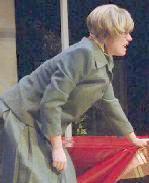
One of Claudia Elmhirst's very funny minor characters, a member of the Board of Governors named Irene Pridworthy, who appears only occasionally and who, according to Toby" should have been held down at a very early age and had rat poison thrust up her nose., "
|
Fri. June 1 at 8 PM; Sun. June 3 at 3 PM; Sat. June 16 at 2 PM; Tues. June 19 at 8 PM; Sun. July 1 at 7 PM
The first half of this is a reprise of Events on a Terrace. But now, Celia has taken a first step towards self esteem by going into the catering business with Hepplewick. Their first enterprise, a tea to be served in the VIP tent on school sports day brings crisis after crisis, and advice from Toby's best friend, school trustee Miles Coombes and a very amusing and oddly misshapen minor character named Irene. The five years later finale reveals how this pratfall rich first gig affects Celia's hopes for becoming a new woman and her relationship with Hepplewick.
A One Man Protest
Sat. June 2 at 8 PM; Sun. June 10 at 7 PM; Wed. June 13 at 8 PM; Sat. June 23 at 2 PM; Tues. June 26 at 8 PM
Miles Coombes and his redheaded wife Rowena aren't any more happily married than Toby and Celia Teasdale. Rowena who views home as a place mainly for people shouting at each others ("That's why we build them. So that people next door can't hear us shouting." ) has vented her disappointment in life with Miles by infidelities with th entire school squash team. Airing their problems, sends Miles into a desperate state that takes the form of his barricading himself in the Teasdale's garden shed. Bill Champion gets a bit of a rest in this one, at least in the part where Coombes is the only male character on stage. But the curmugeonly headmaster Toby and the shaggy-haired Lionel show up so that Champion, like Elmhirst both get their usual workout (3playing characters each)

Love in a Mist
|
Tues. June 5 at 8 PM; Sat. June 16 at 8 PM; Wed. June 20 at 8 PM; Sun. July 1 at 3 PM
Like his friend Toby in Pageant, Miles Coombes feels middle age beckoning. Perhaps it's time to take the plunge and embark on a romantic adventure. After all, it seems his wife, Rowena, is having romantic adventures with half the men in the village. Miles plans the holiday of a lifetime — all he needs is to share it with a sympathetic companion. As luck and Ayckebournewould have it, one man's dream can be another woman's nightmare.
A Cricket Match
Wed. June 6 at 8 PM; Sun. June 10 at 3 PM; Fri. June 15 at 8 PM; Sun. June 24 at 7 PM; Thurs. June 28 at 8 PM
This one has the unhappily married Miles Coombes and Celia Teasdale embark on a secret affair. Unsurprisingly, they are a glumly mismatched couple and there seems no point to the whole enterprise since the secret is known to the whole villageand Miles' wife Rowena isn't the least bit jealous? Added complications result from the fact that Miles is not only Toby's best friend but that both are on the same cricket team. Expect a "friendly" match to provide the de rigeur farcical scene.

A Game of Golf
|
Thurs. June 7 at 8 PM; Sun. June 17 at 7 PM; Fri. June 22 at 8 PM; Sat. June 30 at 2 PM
Once again Celia opts to stand by Toby, now that he's decided to turn over a new leaf and lead a healthier life style. That means he and his cricket parner and best friend Miles take up golf with a vengeance, turning Celia and Miles' wife Rowena into golf widows. Something they don't take to kindly and unwisely decide to have a showdown about on the golf course in the middle of the Ladies' International Friendly Match.
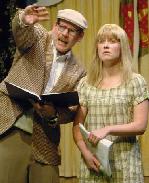
A Pageant
|
Fri. June 8 at 8 PM; Sun. June 17 at 3 PM; Thurs. June 21 at 8 PM; Sat. June 30 at 8 PM
Sylvie Bell, stung by criticism from fiancé, Lionel decides, Eliza Doolittle-like, to improve herself, choosing her employer, headmaster Toby as her Professor Higgins. Toby, agrees and Sylvie in an in with the new and out with the old gives Lionel the heave-ho. Being Sylvie's mentor also has an effect on Toby, making him mellower than he's been with his wife. The resulting marital complications come to a head during the school's historical pageant. The 5-year later sequence sees who Toby ended up with and the current state of his emotions.
A Garden Fête
Sat. June 9 at 8 PM; Thurs. June 14 at 8 PM; Sun. June 24 at 3 PM; Fri. June 29 at 8 PM
This provides another ending for Sylvie Bell's search for a new, more interesting and educated persona via tutoring from Toby Teasdale — a combination that's a sure-fire forumula for trouble.
Try onlineseats.com for great seats to
Wicked
Jersey Boys
The Little Mermaid
Lion King
Shrek The Musical

Easy-on-the budget super gift for yourself and your musical loving friends. Tons of gorgeous pictures.

Leonard Maltin's 2007 Movie Guide

At This Theater
Leonard Maltin's 2005 Movie Guide

 >
>

Wicked
Jersey Boys
The Little Mermaid
Lion King
Shrek The Musical

Easy-on-the budget super gift for yourself and your musical loving friends. Tons of gorgeous pictures.

Leonard Maltin's 2007 Movie Guide

At This Theater
Leonard Maltin's 2005 Movie Guide

 >
>

